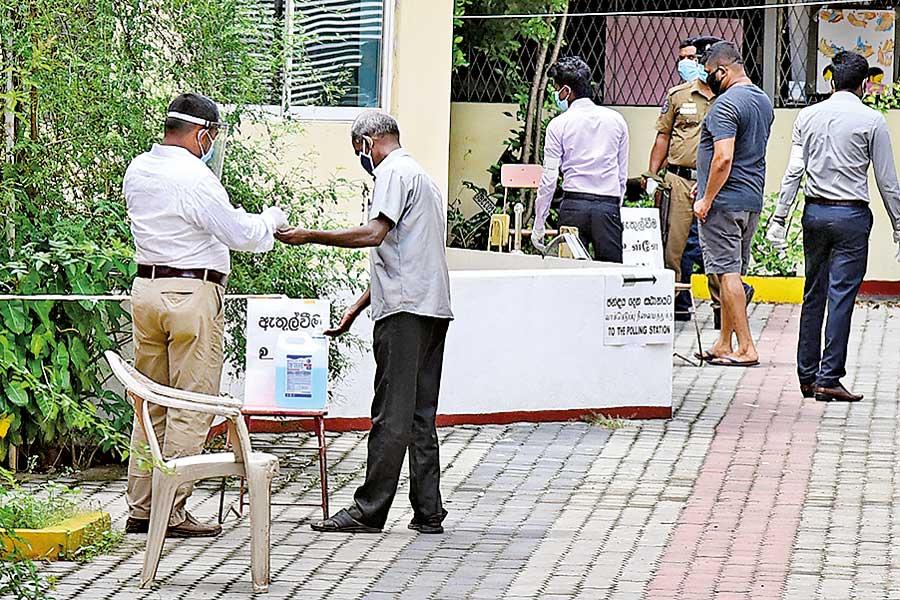Reply To:
Name - Reply Comment

The delicate task of holding a countrywide general election amidst a deadly pandemic was no easy performance. Kudos to the Election Commission (EC), its staff, health officials, police officers and others for their dedication and commitment in upholding a key pillar of democracy – the franchise – while giving paramount importance to the people’s right to life and health. 
They performed a praiseworthy job by balancing the right of the people to remain healthy and their right to elect a government of their choice in an election that was postponed twice on grounds of Covid-19-related safety concerns.
In Article 3, Sri Lanka’s Constitution says sovereignty is in the people and is inalienable; sovereignty includes the powers of government, fundamental rights and the franchise.
Our people-centred sovereignty is further explained in Article 4, according to which the all three arms of government – the executive, the legislature and the judiciary – exercise the powers of the people on their behalf. Article 4 tries to give the broadest possible democracy-driven interpretation to the people’s sovereignty, perhaps in keeping with the social contract as espoused by John Locke. People form governments, said Locke, to protect their right to life, liberty and property, but in order for that to work, people have to follow the laws the government they appoint makes.
In terms of people-centred sovereignty, until the next election, those who were elected in the August 5 general election to represent us in parliament and in the Cabinet – the executive branch of government -- are expected to bear in mind that government is a public trust. But we often find that many of those whom we elect are not so much literate in democracy. This country’s post-Independence election history reveals a declining trend in democracy literacy among the representatives we the people elect to hand them over the sacred duty of exercising our executive, legislative and judicial powers on our behalf. The rot needs to be stopped. We must strive to emerge as a shining light of democracy for the world to point at us and say here’s a nation worthy of being followed by all nations.
Sadly we are far from this ideal state of democracy, despite the successful conduct of regular elections which are marred by allegations of rigging and malpractice. From the deviant path we have taken, we need to return to democracy’s base and take a fresh look at good governance or yahapalanaya. The previous government led by President Maithripala Sirisena and Prime Minister Ranil Wickremesinghe made a mockery of good governance by its appalling failure to ensure public security and its lavish indulgence in corruption. As a result, good governance, a noble concept, has become the most-ridiculed term in Sri Lankan political discourse. This is notwithstanding the yahapalana government’s few but significant democracy-promoting achievements such as the Right to Information Act, the 19th Amendment, restoration of a seemingly independent judiciary and the empowerment of the citizen to protest.
Just because the previous government did not fully honor the trust with regard to good governance does not mean the new government can keep pooh-poohing the concept. Good governance is a challenge. We have no reason not to believe that the new Sri Lanka Podujana Peramuna-led government is capable of taking up that challenge.
The new government led by President Gotabaya Rajapaksa and Prime Minister Mahinda Rajapaksa shall make their government a truly -- as Abraham Lincoln famously said in his Gettysburg speech -- a government of the people, by the people and for the people.
"mocracy, despite the successful conduct of regular elections which are marred by allegations of rigging and malpractice. From the deviant path we have taken, we need to return to democracy’s base and take a fresh look at good governance or yahapalanaya"
Under the pretext of implementing emergency measures to deal with the coronavirus pandemic and the economic crisis, no government elected to office through the people’s franchise has the right to abandon or even suspend good governance, which according to the United Nations, is measured by fundamental factors such as participatory democracy, rule of law, transparency, inclusiveness and accountability. In terms of these requirements, a democratically elected government should ensure that every segment of society, especially the most vulnerable, has representative access to the decision making process. It also means the existence of vibrant civil society, respect for freedom of expression and association and the existence of an independent judiciary that protects human rights and civil liberties.
A good governance government is transparent, with citizens being empowered to challenge proposed legislation and access information on every state action. Although democracy is broadly associated with majoritarianism, the good-governance version of democracy means inclusiveness. The majority can have its way, but the minority must have its say.
In Sri Lanka’s context, inclusiveness has remained elusive only to be exploited by racist elements for political gains, sometimes with state patronage. This needs to change if the new government is to be seen as being committed to good governance. Every citizen must breathe the Sri Lankanness. Inclusiveness is an essential part of meritocracy where one’s race, religion, language or other identities do not matter as long as the person is qualified to hold a post. Everyone should be able to aspire to reach the highest level in government or any organisation.
Accountability is another key feature of good governance. In a government committed to good governance, lawmakers and public servants are held accountable for their action and they are required to abide by the law and act in public spirit.
Good governance should no more be a topic of political jokes in Sri Lanka or a concern only for NGOs or civil society activists. It should be the ultimate aim of any democratic government and also the most suitable yardstick to judge a government’s conduct.
If we were to read again President Gotabaya Rajapaksa’s presidential election manifesto titled ‘Vistas of Prosperity and Splendour’, we may not see any incompatibility with good governance principles. For it speaks of achieving national unity through democratic governance, pluralistic society, elimination of corruption, efficient government and rules-based society.